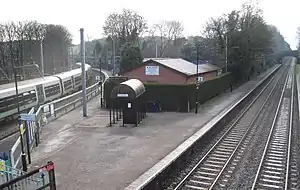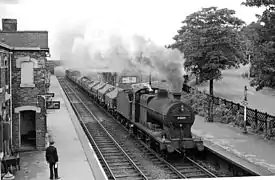Barnt Green railway station
Barnt Green railway station serves the village of Barnt Green, North Worcestershire, England. It is situated 9 1⁄2 miles (15.3 km) south west of Birmingham New Street. The station, and all trains serving it, are operated by West Midlands Trains.
 The Cross-City Line platforms to the left; to the right, the Worcester Line platforms. | |
| Location | Barnt Green, Bromsgrove England |
| Coordinates | 52.3607°N 1.9926°W |
| Grid reference | SP006736 |
| Managed by | West Midlands Trains |
| Platforms | 4 |
| Other information | |
| Station code | BTG |
| Classification | DfT category F1 |
| History | |
| Opened | 1844 |
| Passengers | |
| 2015/16 | |
| Interchange | |
| 2016/17 | |
| Interchange | |
| 2017/18 | |
| Interchange | |
| 2018/19 | |
| Interchange | |
| 2019/20 | |
| Interchange | |
| Notes | |
Passenger statistics from the Office of Rail and Road | |
Barnt Green station is at the point of a 'Y' shaped junction between the main line towards Bromsgrove, Worcester and the south-east, and the branch line to Redditch which is part of the Cross-City Line. It has platforms on both lines, until 2018 only the Redditch line platforms saw regular services, however since Cross-City Line services were extended to Bromsgrove, the main line platforms now also see regular use.
History
The main line through Barnt Green was built and opened by the Birmingham and Gloucester Railway in 1841, but it would be 1844 before Barnt Green received its station.[1] The B&GR was linked to the Bristol and Gloucester Railway in 1845 to create a through route to the West Country and then became part of the Midland Railway's expanding network in 1846. The station then became a junction in 1859 with the opening of the Midland's branch line to Redditch. This was subsequently extended through to Evesham and Ashchurch in stages between 1866 and 1868.[2] The Midland then opened a second route into Birmingham New Street (the Birmingham West Suburban Railway) in 1885 to provide an alternative to the original B&G line via Camp Hill, which was becoming increasingly congested at its eastern end (which it shared with the LNWR main line from Euston and the Midland's own route from Derby).
Though the station was used as an interchange between the two lines from the outset, its main line platforms were initially staggered - the northbound platform being located north of the junction and initially connected to the two southbound ones by a foot crossing (which was replaced by a footbridge in 1895).[3] A second platform on the branch was provided in 1894, when the first 350 yards from the junction were doubled. A more comprehensive rebuilding scheme came in 1928,[4] when the Cofton Tunnel was demolished and replaced by a wide cutting, so that the main line towards Northfield and Kings Norton could be quadrupled by the LMS (who had taken over ownership of the station at the 1923 Grouping). This saw the Birmingham-bound platform relocated south of the junction to create the layout still in use today.
The Evesham loop line through Redditch and Evesham was used in Midland and LMS days as a relief route for freight traffic to avoid the steeply-graded Lickey Incline in addition to carrying local passenger traffic, but under British Rail auspices it was closed to passengers south of Redditch in October 1962 due to the poor condition of the track (formal closure occurring on 17 June 1963) and completely in July 1964.[5]
The remaining part of the branch north of Redditch had seen its service dieselised and improved to hourly in April 1960, only for it to be listed for closure in the Beeching Report of 1963 along with Barnt Green station itself. As a precursor to this, the timetable was drastically cut back in May 1964, with only a handful of (mostly) peak period services being retained. However the route was eventually reprieved in August 1965[6] after protests from local rail users and the area's four MPs.
Stopping trains on the main line southwards toward Worcester Shrub Hill and Cheltenham Spa were withdrawn in April 1966 (though the station at Bromsgrove survived), leaving the by now unstaffed station to be served by the few surviving Redditch to Birmingham trains for the next 14 years (the BR timetable of 1972 lists just four trains in each direction serving all of the surviving local stations on the route - two return trips in the morning peak, one at midday, one in the evening and no Sunday service).
The service level was eventually boosted in May 1980, when hourly trains were reintroduced between Longbridge and Redditch as an extension of the recently commissioned Birmingham Cross-City Line from Lichfield City. This frequency was increased to half-hourly in 1989 and in 1992 the route was electrified (though only the centre main lines were wired beyond Longbridge - the outer lines remain diesel-only and are designated as goods loops). A limited service has also returned to the mainline platforms in recent years, provided by trains on the New St - Worcester - Hereford line (see below).
Services
Southbound Cross-City line services towards Redditch depart from Platform 4, at 20-minute intervals during the daytime but dropping to every half-hour after 20:00 (Monday-Friday, first train departs at 06:30; last train departs at 23:40). Services to Bromsgrove down the Lickey incline began on 29 July 2018, with a 20-minute service in operation from platform 2.
Northbound Cross-City line services towards Birmingham New Street and Lichfield Trent Valley depart alternately from Platform 3 and platform 1, at 10-minute intervals through the day/15 mins after 20:00 (Monday-Friday, first train departs at 06:23; last train departs at 23:08). These trains originate alternately at Redditch and Bromsgrove since the start of operations from the latter on 29 July 2018.
On Sundays there are 3tph to Birmingham New Street (2 from Redditch and 1 from Bromsgrove) with 2tph continuing to Lichfield Trent Valley.
The station is also served by a limited service on the Birmingham-Worcester Line (Monday-Friday only) to/from Worcester, Great Malvern and Hereford.

Facilities
The station has no permanent buildings (the building located behind shrubs adjacent to Platforms 2 and 3 is a private business, in no way affiliated with the station). It has automatic ticket machines located on platforms 3 and 4, and shelters are provided on Platforms 2, 3 and 4. A footbridge connects all four platforms, although there is no access for wheelchairs. There is step-free access to Platforms 1 and 4. The station has a small (charged) car park adjacent to Platform 4 provided jointly by Bromsgrove District Council/West Midlands Trains. The station along with all those located on the Cross-City line has departure boards showing real time train information, located on Platforms 3 and 4.
Future Plans
No future plans are yet available.
See also
| Railway lines in Worcestershire | ||||||||||||||||||||||||||||||||||||||||||||||||||||||||||||||||||||||||||||||||||||||||||||||||||||||||||||||||||||||||||||||||||||||||||||||||||||||||||||||||||||||||||||||||||||||||||||||||||||||||||||||||||||||||||||||||||||||||||||||||||||||||||||||||||||||||||||||||||||||||||||||||||||||||||||||||||||||||||||||||||||||||||||||||||||||||||||||||||||||||||||||||||||||||||||||||||||||||||||||||||||||||||||||||||||||||||||||||||||||||||||||||||||||||||||||||||||||||||||||||||||||||||||||||||||||||||||||||||||||||||||||||||||||||||||||||||||||||||||||||||||||||||||||||||||||||||||||||||||||||||||||||||||||||||||||||||||||||||||||
|---|---|---|---|---|---|---|---|---|---|---|---|---|---|---|---|---|---|---|---|---|---|---|---|---|---|---|---|---|---|---|---|---|---|---|---|---|---|---|---|---|---|---|---|---|---|---|---|---|---|---|---|---|---|---|---|---|---|---|---|---|---|---|---|---|---|---|---|---|---|---|---|---|---|---|---|---|---|---|---|---|---|---|---|---|---|---|---|---|---|---|---|---|---|---|---|---|---|---|---|---|---|---|---|---|---|---|---|---|---|---|---|---|---|---|---|---|---|---|---|---|---|---|---|---|---|---|---|---|---|---|---|---|---|---|---|---|---|---|---|---|---|---|---|---|---|---|---|---|---|---|---|---|---|---|---|---|---|---|---|---|---|---|---|---|---|---|---|---|---|---|---|---|---|---|---|---|---|---|---|---|---|---|---|---|---|---|---|---|---|---|---|---|---|---|---|---|---|---|---|---|---|---|---|---|---|---|---|---|---|---|---|---|---|---|---|---|---|---|---|---|---|---|---|---|---|---|---|---|---|---|---|---|---|---|---|---|---|---|---|---|---|---|---|---|---|---|---|---|---|---|---|---|---|---|---|---|---|---|---|---|---|---|---|---|---|---|---|---|---|---|---|---|---|---|---|---|---|---|---|---|---|---|---|---|---|---|---|---|---|---|---|---|---|---|---|---|---|---|---|---|---|---|---|---|---|---|---|---|---|---|---|---|---|---|---|---|---|---|---|---|---|---|---|---|---|---|---|---|---|---|---|---|---|---|---|---|---|---|---|---|---|---|---|---|---|---|---|---|---|---|---|---|---|---|---|---|---|---|---|---|---|---|---|---|---|---|---|---|---|---|---|---|---|---|---|---|---|---|---|---|---|---|---|---|---|---|---|---|---|---|---|---|---|---|---|---|---|---|---|---|---|---|---|---|---|---|---|---|---|---|---|---|---|---|---|---|---|---|---|---|---|---|---|---|---|---|---|---|---|---|---|---|---|---|---|---|---|---|---|---|---|---|---|---|---|---|---|---|---|---|---|---|---|---|---|---|---|---|---|---|---|---|---|---|---|---|---|---|---|---|---|---|---|---|---|---|---|---|---|---|---|---|---|---|---|---|---|---|---|---|---|---|---|---|---|---|---|---|---|---|---|---|---|---|---|---|---|---|---|---|---|---|---|---|---|---|---|---|---|---|---|---|---|---|---|---|---|---|---|---|---|---|---|---|---|---|---|---|---|---|---|---|---|---|---|---|---|---|---|---|---|---|---|---|---|---|---|---|---|---|---|---|---|---|---|---|---|---|---|---|---|---|---|---|---|---|---|---|---|---|---|---|---|---|---|---|---|---|---|---|---|---|---|---|---|---|---|---|---|---|---|---|---|---|---|---|---|---|---|---|---|---|---|---|---|---|---|---|---|---|---|---|---|---|---|---|---|---|---|---|---|---|---|---|---|---|---|---|
| ||||||||||||||||||||||||||||||||||||||||||||||||||||||||||||||||||||||||||||||||||||||||||||||||||||||||||||||||||||||||||||||||||||||||||||||||||||||||||||||||||||||||||||||||||||||||||||||||||||||||||||||||||||||||||||||||||||||||||||||||||||||||||||||||||||||||||||||||||||||||||||||||||||||||||||||||||||||||||||||||||||||||||||||||||||||||||||||||||||||||||||||||||||||||||||||||||||||||||||||||||||||||||||||||||||||||||||||||||||||||||||||||||||||||||||||||||||||||||||||||||||||||||||||||||||||||||||||||||||||||||||||||||||||||||||||||||||||||||||||||||||||||||||||||||||||||||||||||||||||||||||||||||||||||||||||||||||||||||||||
References
- "Barnt Green Junction". Warwickshire Railways. Retrieved 11 December 2013.
- "Ashchurch". Disused Stations. Retrieved 11 December 2013.
- "Photo of Barnt Green station in 1921". Warwickshire Railways. Retrieved 11 December 2013.
- "Barnt Green Railway Station". BBC Domesday Reloaded. Retrieved 11 December 2013.
- "Redditch". Disused Stations. Retrieved 31 May 2016.
- "History of the Cross-City Rail Line". Redditch MRC. Retrieved 11 December 2013.
Further reading
External links
| Wikimedia Commons has media related to Barnt Green railway station. |
- Train times and station information for Barnt Green railway station from National Rail
| Preceding station | Following station | |||
|---|---|---|---|---|
| West Midlands Railway Cross-City Line | ||||
| West Midlands Railway Cross-City Line | ||||
| West Midlands Railway Birmingham-Hereford (peak times) | ||||
| Historical railways | ||||
| Terminus | Midland Railway | Line and station open |
||
Line and station open | Midland Railway | Line and station open |
||